Best Laptop for Data Science Students (Top 5 Picks for 2025)
When you’re searching for the best laptops for data science, you can’t go wrong with options like the Apple 2024 MacBook Pro with M4 chip, Acer Swift X 14, or ASUS Vivobook S 14 OLED. These laptops offer powerful processors, high RAM capacity, and stunning display resolutions to handle complex tasks effortlessly. Battery life, portability, and connectivity options also matter for your mobile lifestyle. Stick around to discover more about each laptop’s standout features and how they meet your needs.
In the interest of full disclosure, we would like to inform you that some links on our website are affiliate links. By clicking on these links and completing a purchase from our partners, we may receive a nominal commission at no extra cost to you. Rest assured, our affiliate partnerships do not compromise the integrity of our editorial content or product evaluations. For further clarification, kindly refer to our comprehensive affiliate disclosure.
Table of Contents
What Are the Best Laptop for Data Science Students to Buy This Year?
Here are my top picks for the best laptop for data science students, you can consider this year.
Apple MacBook Pro Laptop with M4 Chip (14.2-inch Liquid Retina XDR Display)
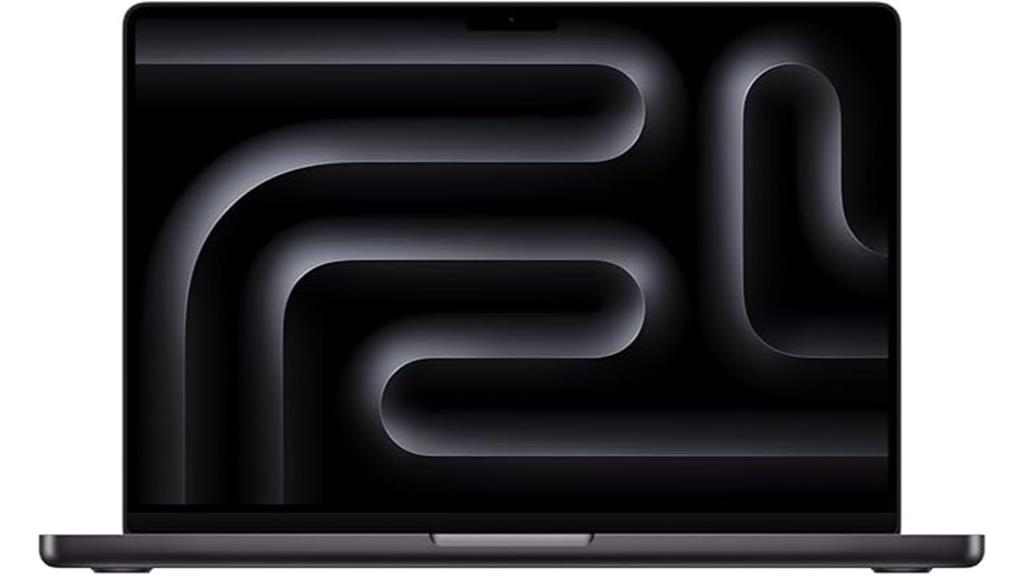
The Apple 2024 MacBook Pro with the M4 chip is a powerhouse for data science students who demand top-notch performance. With its 10-core CPU and GPU, you’re set for exceptional speed while multitasking and running demanding applications. The 14.2-inch Liquid Retina XDR display boasts stunning visuals, featuring a peak brightness of 1600 nits and a contrast ratio of 1,000,000:1, making data analysis a pleasure. Plus, with 16GB of unified memory and 512GB SSD storage, you won’t have to worry about lag. Enjoy seamless integration with your other Apple devices, enhancing your productivity and overall user experience.
Best For: Data science students and professionals who require high performance and exceptional display quality for their work.
Pros:
- Exceptional performance with the M4 chip’s 10-core CPU and GPU, perfect for multitasking and demanding applications.
- Stunning visuals from the 14.2-inch Liquid Retina XDR display, offering high brightness and contrast for detailed data analysis.
- Seamless integration with other Apple devices, enhancing productivity through features like iPhone Mirroring and FaceTime.
Cons:
- High price point compared to other laptops, which may not be accessible for all students.
- Limited upgrade options for memory and storage post-purchase, as components are soldered.
- Compatibility concerns with certain specialized software that may not run as efficiently on macOS.
Acer Swift X 14 Laptop (SFX14-72G-77NJ)
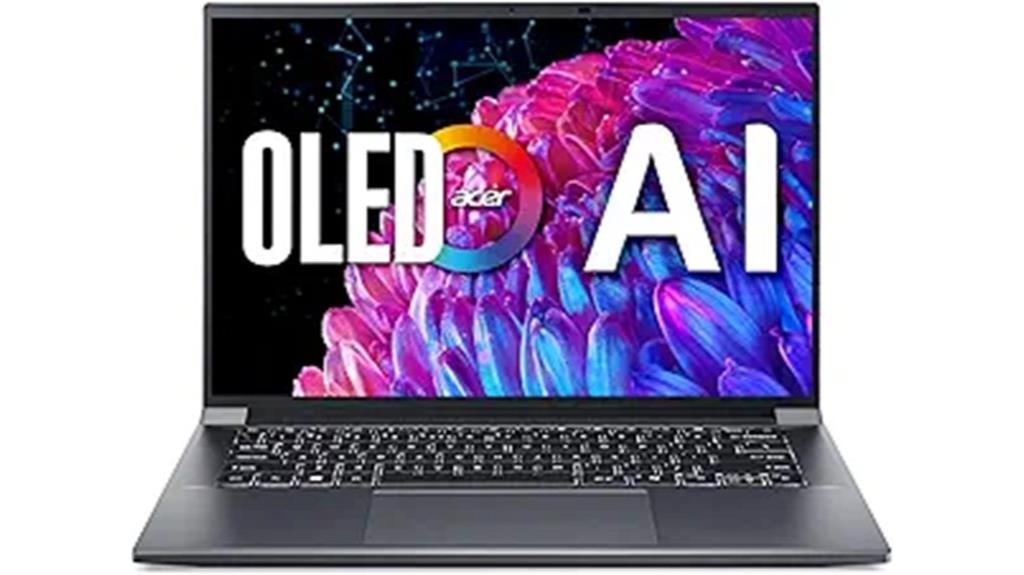
For data science students seeking a powerful yet portable solution, the Acer Swift X 14 Laptop (SFX14-72G-77NJ) stands out with its Intel Core Ultra 7 processor and NVIDIA GeForce RTX 4060 GPU. This laptop optimizes performance with AI tools, making it perfect for demanding applications. Its 14.5-inch OLED display boasts a 2880 x 1800 resolution and TÜV Rheinland certification, ensuring eye comfort during long study sessions. With 16GB memory and a 1TB SSD, multitasking is seamless. Plus, advanced collaboration features enhance your video calls, making it an excellent choice for connecting with peers and professors alike.
Best For: Data science students and creators seeking a powerful, portable laptop with advanced AI features and high-quality display.
Pros:
- High performance with Intel Core Ultra 7 processor and NVIDIA GeForce RTX 4060 GPU, ideal for demanding applications.
- Stunning OLED display with 2880 x 1800 resolution and TÜV Rheinland certification for reduced eye strain.
- Robust collaboration tools including a 1080p FHD webcam and AI noise reduction for enhanced video call quality.
Cons:
- Limited upgradeability due to soldered RAM and SSD, potentially restricting future enhancements.
- Higher price point compared to basic laptops, which may not suit every budget.
- Battery life could be impacted during heavy GPU usage, particularly with graphically intensive tasks.
Apple 2025 MacBook Air 15-inch Laptop with M4 chip
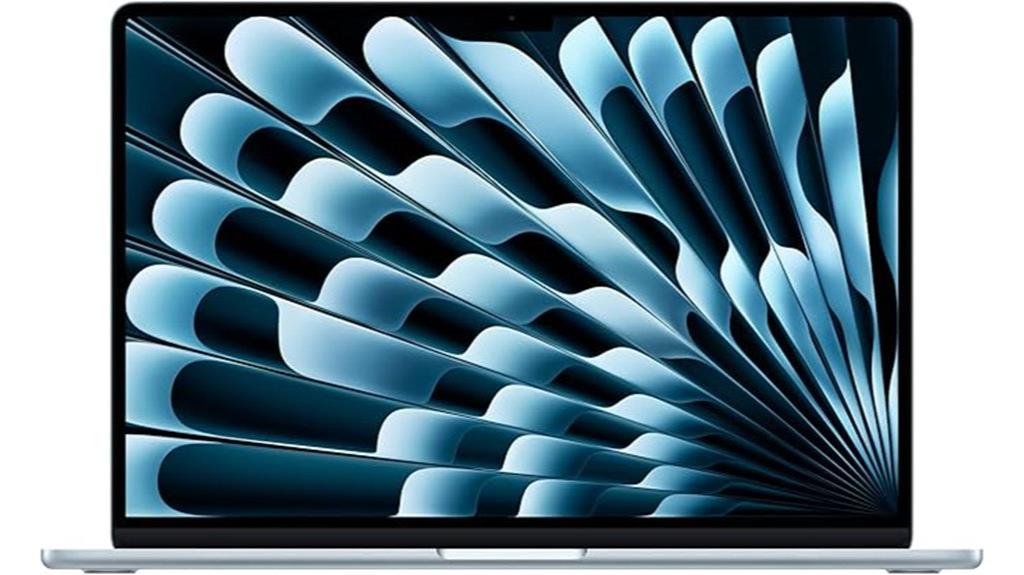
Powered by the M4 chip, the Apple 2025 MacBook Air 15-inch Laptop is an ideal choice for data science students who need speed and efficiency for multitasking. With its impressive battery life of up to 18 hours, you can work seamlessly whether you’re plugged in or on the go. The stunning 15.3-inch Liquid Retina display showcases a billion colors, enhancing your data visualizations and presentations. Plus, the 12MP Center Stage camera and Spatial Audio create an immersive experience for online collaboration. With robust connectivity options, including Thunderbolt 4 ports and Wi-Fi 6E, this MacBook ensures you’re always connected and productive.
Best For: Data science students who require high performance and efficiency for multitasking, data visualization, and online collaboration.
Pros:
- Enhanced performance with the M4 chip for seamless multitasking and fast processing.
- Impressive 15.3-inch Liquid Retina display providing vibrant colors and sharp details, ideal for data presentations.
- Long battery life of up to 18 hours, allowing for extended use without frequent charging.
Cons:
- Limited upgrade options as the hardware is typically non-upgradable post-purchase.
- Higher price point compared to some competitors with similar specifications.
- Two Thunderbolt 4 ports may not be sufficient for users needing multiple connections simultaneously without additional adapters.
ASUS Vivobook S 14 OLED Slim Laptop (M5406WA-DS76)
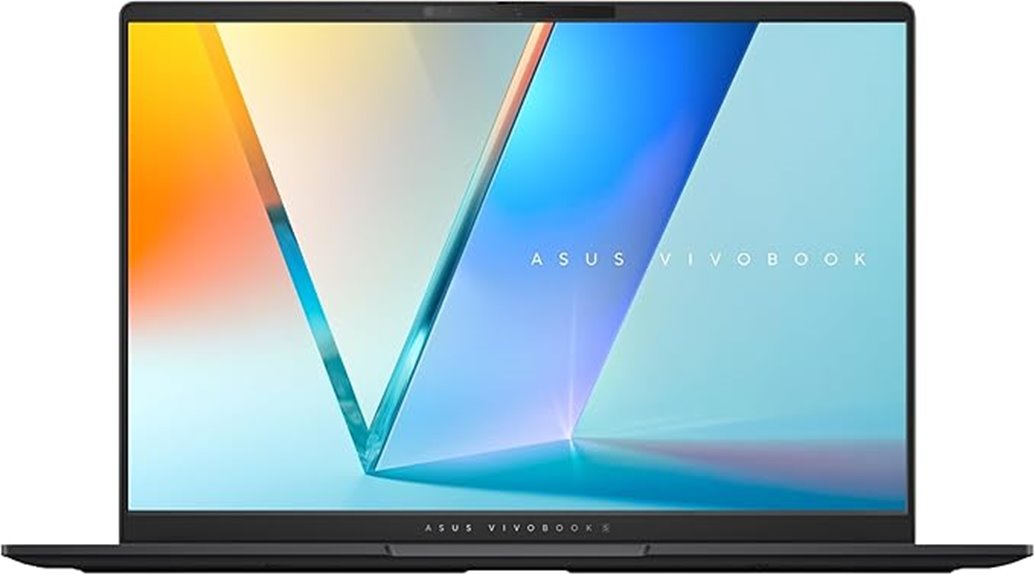
With its powerful AMD Ryzen 9 365 processor and 24GB of LPDDR5X RAM, the ASUS Vivobook S 14 OLED Slim Laptop (M5406WA-DS76) is an excellent choice for data science students looking for a reliable machine. The stunning 14” 3K OLED display ensures vibrant visuals with a 120Hz refresh rate, perfect for analyzing data and presentations. Weighing just 2.87 lbs and only 0.63” thick, it’s easy to carry around campus. You’ll appreciate the customizable RGB backlit keyboard that enhances your typing experience. Plus, with ample connectivity options, you can easily integrate your devices and peripherals for seamless productivity.
Best For: Data science students and professionals who need a powerful, portable laptop with a high-quality display for data analysis and presentations.
Pros:
- High Performance: Equipped with an AMD Ryzen 9 365 processor and 24GB LPDDR5X RAM for efficient multitasking and processing.
- Stunning Display: The 14” 3K OLED display with 120Hz refresh rate provides vibrant visuals and smooth viewing experiences.
- Lightweight and Portable: At only 2.87 lbs and 0.63” thick, it’s easy to carry around for classes or meetings.
Cons:
- Limited Storage: The 512GB SSD may be insufficient for users with extensive data storage needs.
- Single-Zone RGB Keyboard: Customization is limited to a single zone, which may not meet the preferences of some users.
- Price Point: Higher-end specifications may come with a premium price, making it less accessible for budget-conscious students.
Samsung Galaxy Book4 Pro Business Laptop (NP944XGK-KG4US)
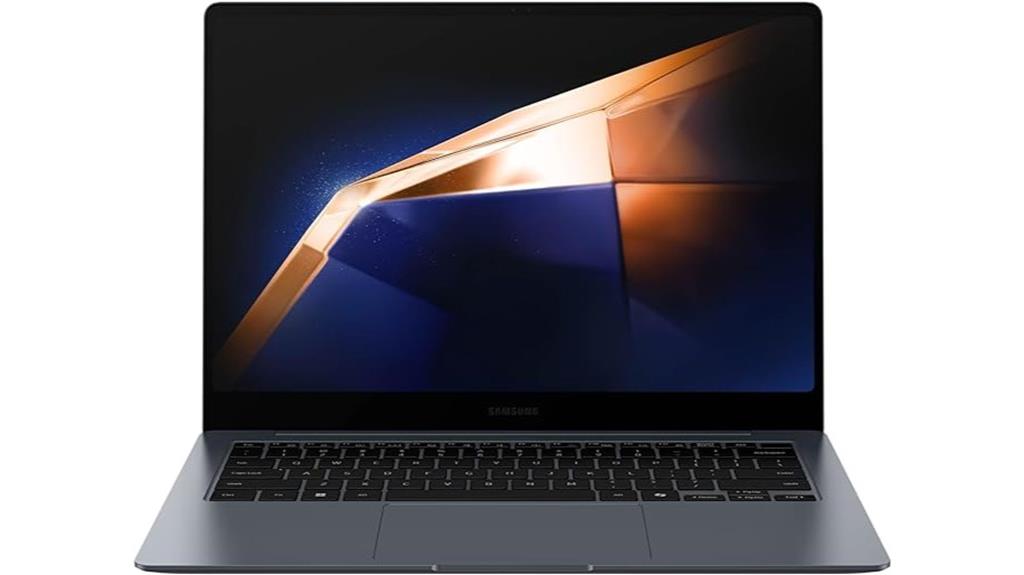
The Samsung Galaxy Book4 Pro Business Laptop (NP944XGK-KG4US) stands out as an excellent choice for data science students who need a powerful and portable device. With an Intel Core Ultra 7 processor, 32GB of RAM, and a 1TB SSD, it handles multitasking with ease. The 14-inch 3K AMOLED touchscreen provides stunning visuals, while its lightweight design (just 2.71 lbs) makes it perfect for on-the-go professionals. You’ll appreciate the fast charging and impressive battery life, ensuring you stay productive throughout the day. Plus, its seamless connectivity with Samsung devices enhances your workflow, making it a valuable addition to your toolkit.
Best For: Data science students and professionals seeking a powerful, portable laptop for multitasking and seamless connectivity.
Pros:
- Exceptional performance with Intel Core Ultra 7 processor, 32GB RAM, and 1TB SSD for efficient multitasking.
- Stunning 14-inch 3K AMOLED touchscreen display with anti-reflective features for clear visibility in bright conditions.
- Lightweight design at just 2.71 lbs, making it ideal for on-the-go use and fast charging capabilities.
Cons:
- High retail price of $1749 compared to competitors offering similar specs at lower prices.
- Limited RAM upgrade options in the US, Canada, and UK, with a maximum of 16GB.
- Perceived low quality of the OEM SSD from Western Digital for the price point.
ALSO READ: Best Laptops for Web Development, Best Laptops for Teletherapy, Best Laptops for Instructional Designers, Best Laptop for Outdoor Use, Best Laptop for Serato Dj, Best Laptops for Interior Designers, Best Laptop for Serato, Best Laptop for Forex Trading, Best Laptops for Telehealth, Best Laptop for Djs
Factors to Consider When Choosing the Best Laptop for Data Science Students
When choosing a laptop for your data science studies, you need to focus on several key factors. Performance and processing power are crucial for handling complex data tasks, while display quality can affect your viewing experience. Don’t forget to consider battery life, portability, and connectivity options to ensure your laptop meets all your needs.
Performance and Processing Power
Choosing a laptop for data science requires careful consideration of performance and processing power, as these factors directly impact your ability to efficiently handle complex computations and large datasets. Look for a powerful multi-core processor like an Intel Core i7 or AMD Ryzen 7 to tackle demanding tasks. A minimum of 16GB of RAM is essential for smooth multitasking, but aim for 32GB if you’re working with larger datasets or advanced machine learning models. A dedicated graphics card, such as NVIDIA’s RTX series, will boost performance for deep learning and data visualization. Additionally, opt for at least 512GB of SSD storage to ensure quick access to your data. Finally, advanced cooling systems are crucial to prevent overheating during intensive processes.
Display Quality and Resolution
While you might be focused on performance specs, display quality and resolution are just as crucial for data science students. A higher resolution, like 2880 x 1800 or 3840 x 2160, provides clearer visuals and more screen real estate, making it easier to analyze complex datasets. Look for displays with high refresh rates, around 120Hz, to ensure smoother transitions and reduce motion blur during dynamic data visualizations. Accurate color representation is vital, so consider displays with a 100% DCI-P3 color gamut. HDR support enhances details in shadows and highlights, improving your ability to interpret visual data. Lastly, a touchscreen interface can make manipulating data visualizations more intuitive and interactive, further enhancing your workflow.
Battery Life and Efficiency
In the world of data science, having a laptop that can keep up with your demanding workloads is key, and that includes battery life and efficiency. You’ll want a laptop with at least 8 hours of battery life to support extended coding sessions and data analysis without interruptions. Look for efficient power management features in newer processors that balance performance and power consumption, helping extend battery life during intensive tasks. Fast charging capabilities are also crucial, minimizing downtime and letting you get back to work quickly. Energy-efficient displays like OLED or IPS panels can further lower power consumption while delivering excellent visuals. Lastly, integrated battery management software can optimize settings based on your usage, ensuring your laptop stays healthy over time.
Portability and Weight
When you’re studying data science, portability and weight can make a significant difference in your daily routine. Lightweight laptops, ideally under 3 pounds, are perfect for students who frequently move between classes, libraries, or coffee shops. Opt for models with a slim profile—around 0.6 inches thick or less—so they easily fit in your backpack without adding bulk. A compact 14-inch display strikes a balance between offering enough screen space for data visualization and maintaining portability. Additionally, choose laptops with at least 8 hours of battery life to ensure you can work uninterrupted. Don’t forget to look for durable construction features, like reinforced hinges and lightweight materials, to withstand the rigors of commuting.
Connectivity Options and Ports
Maintaining portability is important, but having the right connectivity options and ports can significantly enhance your productivity as a data science student. You’ll need multiple USB-A and USB-C ports to connect peripherals like external hard drives and monitors. Thunderbolt ports are invaluable, supporting high-speed data transfer and allowing you to daisy-chain several devices for a streamlined workflow. An HDMI port is crucial for linking to external displays or projectors during presentations, helping you visualize data effectively. A microSD card reader simplifies transferring data from cameras, essential for collecting and analyzing information. Lastly, ensure your laptop supports the latest wireless standards, like Wi-Fi 6E and Bluetooth 5.3, for fast internet and seamless device communication in your data science endeavors.
Software Compatibility and Ecosystem
Choosing the right laptop for data science hinges on software compatibility and ecosystem integration, as these factors can make or break your productivity. You’ll want a machine that supports popular programming languages and frameworks like Python, R, TensorFlow, and PyTorch for smooth operation. Consider the operating system carefully; many data science tools perform best on macOS or Linux. Ensure your laptop integrates well with cloud platforms like AWS, Google Cloud, or Azure, granting access to large datasets and computational resources. A cohesive ecosystem enhances your workflow, so look for compatibility with tools like Jupyter notebooks and Git. Lastly, ensure sufficient processing power and RAM to run virtual machines or containers effectively, as these are often essential for your tasks.
Frequently Asked Questions
What Is the Average Lifespan of a Good Data Science Laptop?
A good data science laptop typically lasts around three to five years, depending on usage and maintenance. You should consider upgrading if performance declines significantly to keep up with evolving technology and software demands.
Are Refurbished Laptops Suitable for Data Science Studies?
Refurbished laptops can be suitable for your data science studies if they meet performance requirements. Just ensure they have adequate RAM, a decent processor, and a reliable warranty, so you won’t face unexpected issues later.
How Much RAM Is Ideal for Data Science Tasks?
For data science tasks, you’ll want at least 16GB of RAM. This ensures smooth multitasking and efficient processing of large datasets. If possible, aim for 32GB to future-proof your setup and enhance performance.
Can I Use a Gaming Laptop for Data Science?
You can definitely use a gaming laptop for data science. They typically have powerful processors and ample RAM, making them suitable for handling large datasets and running complex algorithms efficiently. Just ensure you have the right software installed.
What Software Is Essential for Data Science Students?
You’ll need essential software like Python, R, Jupyter Notebook, and SQL. Additionally, tools like TensorFlow and Pandas can help you analyze data effectively. Don’t forget about data visualization tools to present your findings clearly!
My Final Opinion
In summary, choosing the right laptop as a data science student is crucial for your success. Each of these options offers a blend of power, performance, and portability to handle your demanding tasks. Whether you prefer the sleek design of the MacBook Pro or the versatility of the Acer Swift X, you’ll find a laptop that suits your needs. Make sure to consider your specific requirements and budget to find the perfect fit for your data science journey.